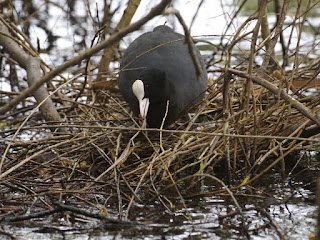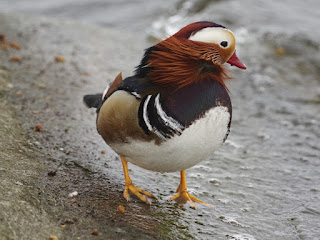The Goldcrests could be seen dashing about in the tree, but didn't come into view for long enough to take a picture. However, in the same place there were a Chaffinch ...
... a Robin ...
... a Wren ...
... and a Coal Tit.
A Long-Tailed Tit crossing the path near Peter Pan looked sombre against a dull grey cloud.
On the other side of the lake a Blue Tit emerged from its nest hole, rather tentatively when it saw a camera pointed at it, but eventually it decided it was all right to come out.
A Blackcap sang in a hawthorn tree.
A Jackdaw looked into a nest hole in a dead tree near the Albert Memorial.
The young Grey Herons were climbing and flapping around their nest. In the background is the new nest with a couple of adults on it.
The sound of heron chicks begging could be heard from the nest on the other side of the island. I've been keeping an eye on it from the other side of the lake, but haven't seen them yet.
A handful of Black-Headed Gulls are still lingering on the Serpentine.
The Great Crested Grebes at the west end of the island have finally succeeded in attaching a nest of sorts to the wire basket.
The Coot nest under the willow near the bridge, unattended for several days, is now occupied again, dashing the hopes of the grebe who was hanging around hoping to steal it.
A pair of Mute Swans made a nest at the end of the reed bed under the Diana fountain. This is not a good place, but they haven't much choice. The male swan picked reeds and passed them to his mate, who arranged them.
The pair of Canada Geese thrown off the little island by the dominant Mute Swan were starting a nest in a reed bed on the other side of the Long Water.
There have been no further casualties in the two Egyptian Goose families. One still has six goslings ...
... and the other has two.
The six goslings are wandering around dangerously despite constant calls from their mother. This contrasts sadly with the behaviour of Canada and Greylag goslings, which follow their mother like a shadow, and of course have a much higher survival rate.
A brisk chilly wind was blowing, disarranging a Mandarin beside the Serpentine.
















Blue Tits are so clever. They can read a situation correctly in a split second.
ReplyDeleteWell done to the Grebe's successfully attaching the nest! (btw, is that construction with the genitive and the gerund correct? I have recently been
chastised for using it).
Why are Egyptian goslings so neglectful, I wonder, compared to other goslings. It's as if it were daring each other to survive.
You're really congratulating the grebe, not the action, so it should be 'Well done to the grebe for attaching the nest.' But we shall see how well it has done the next time there's a strong wind.
Delete